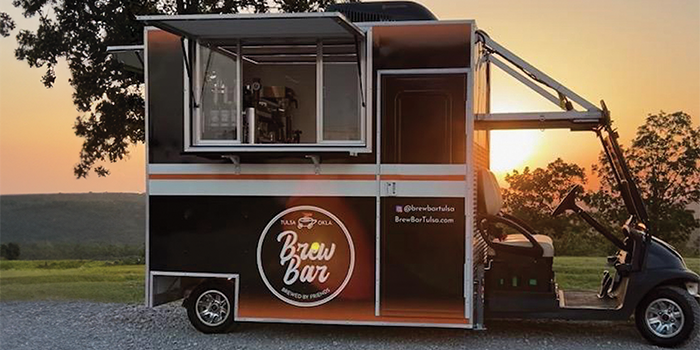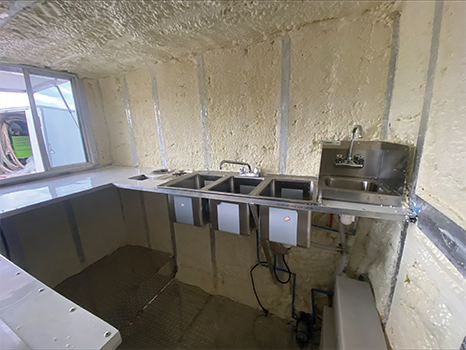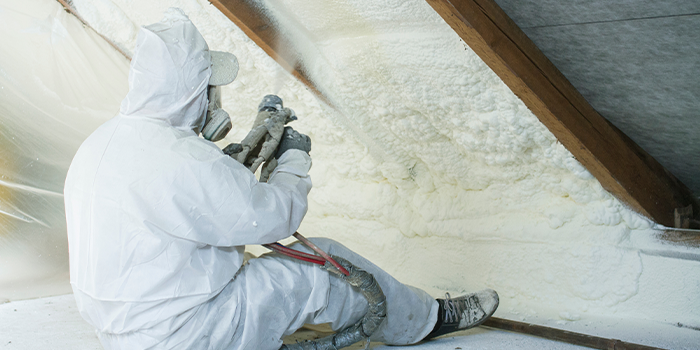
Spill the Beans

SPRAY FOAM MAGAZINE – Love them or hate them, golf carts have been popular in the U.S. since the 1950s. However, it was a few decades earlier when the first golf cart was made in 1932 by disabled golfer Lyman Beecher, in his home state of Florida. Beecher improved upon his initial design by adding six car batteries and two more wheels to make it independently operated, but it was only suitable for short distances. As time went by, the golf cart had numerous designers innovate the initial concept, making both gas and electric golf carts.
Today, the electric golf cart is extremely popular, and what was once seen as the height of luxury soon became commonplace on golf courses around the globe. The name ‘golf cart’ suggests that these mini vehicles are for golf course use only, but that is not the case with copious communities around the U.S. modifying these carts. Whether it’s customizing the look to resemble an iconic sports car, or decorating it for the holidays, these simple carts have endless design possibilities.
These carts’ popularity has led them to be referred to as NEVs (Neighborhood Electric Vehicles) which sounds a little less like “Older generation at the golf course” and more, like “Young generation having an eco-friendly vehicle at their disposal.” What do NEVs have to do with SPF? The Spray Foam Magazine team spoke with David Jacobs at Scorpion Spray Foam Insulation LLC to find out why they applied SPF to a modified golf cart.
Located in Tulsa, Oklahoma Scorpion Spray Foam Insulation, LLC provides spray polyurethane foam insulation for commercial, residential, and agricultural projects. From the design stages to the closeout of each project, they are a company dedicated to providing, “The next level in quality” spray foam insulation installation to a home, corporate building, or metal structure. Their team has 50 years of combined construction experience and 16 years of that in the spray foam industry. Their knowledge and attention to detail, as well as team members who are certified through the Air Barrier Association of America and the Spray Polyurethane Foam Alliance, made Scorpion an easy choice for a new business needing their services.
Jacobs started his career in SPF roofing and equipment and has been in the spray foam industry for twenty-three years. He transferred his industry knowledge to Scorpion when he joined the company in August 2022 as the director of operations. Jacobs runs the day-to-day operations of the business, focusing on the business’s 90% commercial and 10% residential projects.
How did this unusual project materialize? Scorpion has many great business relationships with project managers (PM). One of these PMs, Joshua Grant, told them about a passion project he was undertaking, named The Brew Bar, where he planned on converting a golf cart into a portable coffee bar. Grant came up with the idea after he heard about the concept during a career seminar. The speaker of that seminar spoke about a friend’s mobile coffee shop business in Seattle and started talking about how much a cup of coffee cost versus how much it cost to make the cup. Grant recognized the potential for an impressive profit and he saw this concept's potential in the Tulsa market.
The Brew Bar’s modified golf cart/NEV addition was built around the outside of the golf cart making it compact and smaller than a food truck, so it’s easy to enter limited-access areas. Because Grant already knew Scorpion’s quality work, he wanted them to spray foam the interior for the R-value per inch. The addition to the cart is a conditioned all-metal space, so they needed to achieve an air, vapor, and thermal barrier which he knew SPF would do.
Jacobs went to the trailer builder to look at the golf cart with its new extension and was impressed with what he saw. He decided then and there that he wanted to be part of this project and he wanted to be the one to spray it. Jacobs sprayed the box trailer, which measured six ft wide by 11 ft tall by ten ft long (14 ft including the golf cart cab), with one and a half inches of Huntsman PROSEAL closed-cell foam and then shaved it down.
Jacobs said, “There is no other insulation that could have achieved all the ticks Grant wanted and needed for his project.” Grant backs up this response by saying, “Serving coffee, we know we’ll be out in the elements so there was no question we needed to insulate the cart. Spray foam was the only way we felt the cart would get adequate thermal protection from the elements.”
Scorpion uses Akurate Dynamics (AD) equipment, a manufacturer Jacobs knows well because he worked for them for several years. He has utter faith in their products and their on-ratio performance; therefore, Scorpion’s three rigs all carry AD equipment. After the foam was applied, it was skimmed, and filled with a fire caulking.

One and a half inches of closed-cell foam was installed to the interior of the box trailer before being shaved down.
Photo Courtesy of Scorpion Spray Foam Insulation LLCThe inside of the finished cart is impressive with a two-group espresso machine, a coffee grinder, a coffee maker, a refrigerator, a kegerator (for cold brew), a three compartment sink, shelves for storing overstock, and another sink for washing hands. The Brew Bar launched earlier this year and is already creating a positive stir in Tulsa. Their made-from-scratch beverages with options like superior coffees, white chocolate mocha, and hot chocolate are all served out of their tricked-out golf cart. They have parked up at weddings, parties, office socials, and many more events to make and deliver these handcrafted beverages.
With the addition of closed-cell spray foam, the cart now has no concern of moisture buildup. This has made this souped-up cart, not only comfortable and able to thwart mold, mildew, and fungus, but also able to help a non-grounded vehicle deliver a quality cup of coffee. Unusual and fun spray foam application jobs like this one, really are a perk of the job!
For use by SprayFoamMagazine.com & Spray Foam Magazine












